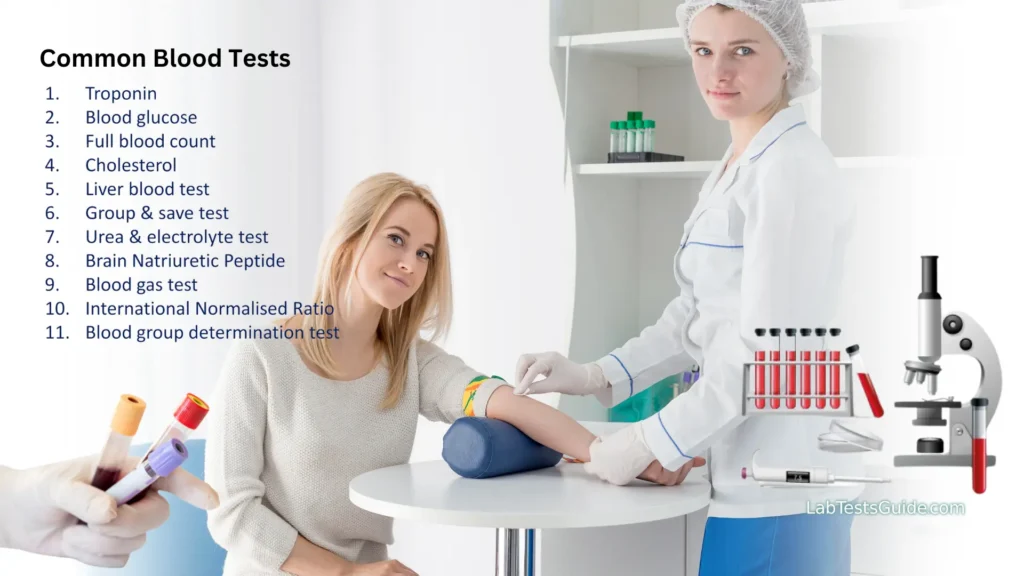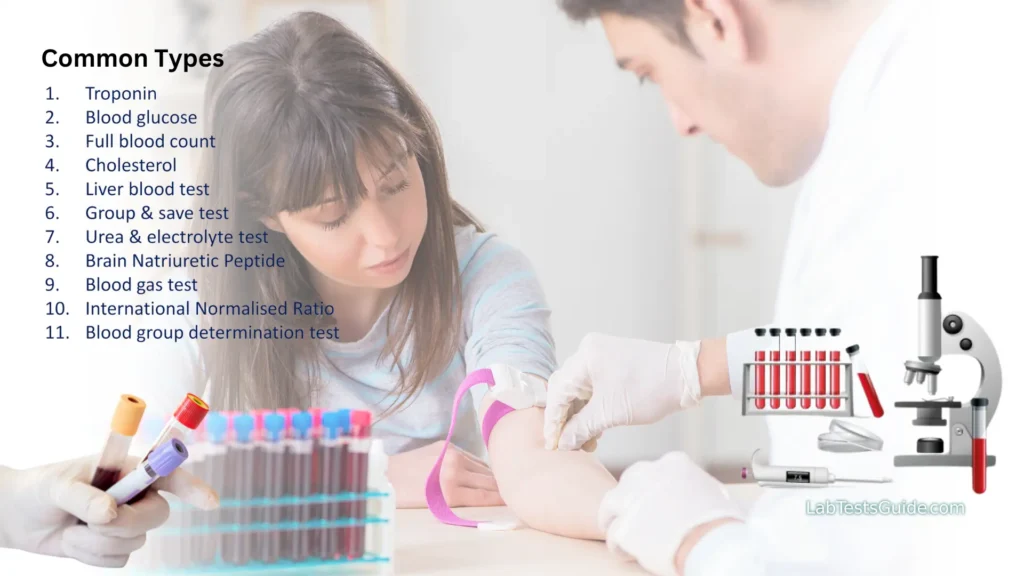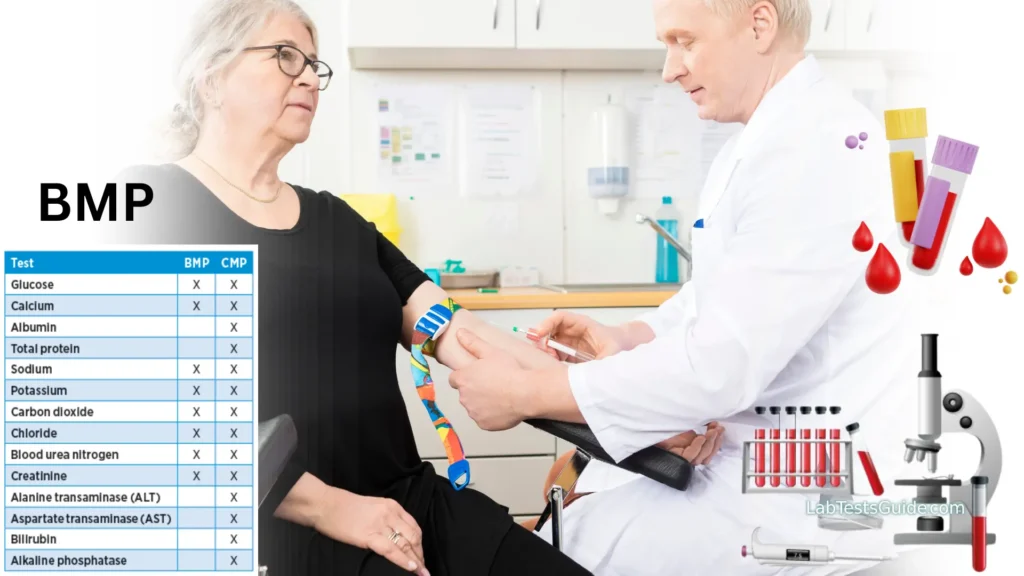A blood test is among the most frequently used diagnostic tools by healthcare providers to assess overall health or aid in identifying medical conditions. It may be conducted during a routine physical exam or in response to specific symptoms.

What are blood tests?
Blood tests are routine lab analyses that examine cells, chemicals, proteins, and other substances in the blood. They’re crucial for assessing health, diagnosing conditions, and monitoring diseases like diabetes or high cholesterol. Typically part of regular checkups or when symptoms arise, these tests involve extracting a small blood sample for analysis.
When would I need to have a blood test?
Your blood is pivotal to your overall health, providing crucial insights into your body’s functioning. This is why blood tests are frequently performed in medical practice. You may need a blood test for various reasons:

- During Your Annual Physical Exam: Your doctor may order a general blood test such as a complete blood count (CBC).
- At Risk of a Health Condition: Specific tests may be necessary if you’re at higher risk due to genetic factors or lifestyle.
- Monitoring a Known Condition: To track progression or effectiveness of treatment for existing health issues.
- Experiencing Symptoms: Confirming a suspected diagnosis or determining the need for further testing.
- Pregnancy: Routine tests like CBC and blood type testing are common during pregnancy.
- Before Surgery: Assessing risks such as bleeding tendencies before a surgical procedure.
- Health Optimization: Understanding blood components like cholesterol levels to refine diet and fitness plans.
What do blood tests show?
Blood tests reveal essential information about your health:
- Blood Cell Counts: Indicate levels of red blood cells, white blood cells, and platelets.
- Chemical Levels: Measure glucose, electrolytes, and enzymes to assess organ function.
- Lipid Levels: Check cholesterol and triglycerides for heart health.
- Proteins and Hormones: Detect abnormalities or imbalances influencing bodily functions.
- Genetic Markers: Identify inherited conditions or predispositions.
These insights help diagnose conditions, monitor treatments, and guide health management.
What are the most common blood tests?
Regular blood work is essential for understanding what’s happening inside your body, even if you feel healthy. These tests help identify risks early and diagnose conditions when they’re most manageable. Here are key blood tests your doctor may recommend:

- Complete Blood Count (CBC): Measures red blood cells, white blood cells, and platelets to detect infections, anemia, and more serious conditions.
- Basic Metabolic Panel (BMP): Checks glucose levels, electrolyte balance, and kidney function through plasma analysis.
- Comprehensive Metabolic Panel (CMP): Includes BMP components plus liver function tests and protein levels, offering a broader health assessment.
- Lipoprotein (Lipid) Panel: Evaluates cholesterol and triglyceride levels, crucial for assessing heart disease risk.
- HbA1c: Monitors average blood sugar levels over time, aiding in diabetes diagnosis and management.
- Thyroid Panel: Assesses thyroid hormone levels affecting metabolism and overall health.
- Coagulation Panel: Tests blood clotting ability, vital before surgeries or with bleeding disorders.
These tests help tailor your health management plan based on your unique needs and risk factors. Regular discussions with your doctor can determine which tests are appropriate and how often they should be conducted.
Common Types of Blood Tests:
Lab Tests Guide outlines various blood tests crucial for assessing heart and circulatory conditions. These tests provide vital insights into cardiac health, aiding in diagnosis, treatment, and ongoing management. Understanding what each test reveals can significantly impact patient care and outcomes.

- Urine Test: Assesses various components for signs of infection or disease.
- Blood Tests: Comprehensive analysis including lipid profiles, liver function, and blood cell Counts.
- Tumor Markers: Identifies specific substances indicative of tumor presence or progression.
Here’s a concise summary of the various blood tests relevant to heart and circulatory conditions:
- Troponin: Detects heart muscle damage during chest pain episodes, aiding in prompt heart attack diagnosis and treatment in hospitals.
- Blood Glucose (Hb A1c): Measures average blood sugar levels over time, crucial for diagnosing and managing diabetes. Fasting may be required for accurate results.
- Cholesterol (Lipid Profile): Assesses total cholesterol, LDL (bad) cholesterol, HDL (good) cholesterol, and triglycerides to evaluate heart disease risk and treatment effectiveness, often done annually.
- Liver Blood Tests: Evaluates liver health by analyzing enzyme and protein levels, helping diagnose liver damage or disease.
- Full Blood Count (FBC): Examines blood cells to detect anemia, infections, or viral conditions like myocarditis, providing insights into overall health.
- Group and Save Test: Determines blood group and screens for antibodies to ensure safe transfusions, conducted before surgeries or emergency transfusions.
- Urea and Electrolytes (U&E): Checks electrolyte levels (sodium, potassium, magnesium) critical for heart rhythm and kidney function, guiding medication adjustments.
- Brain Natriuretic Peptide (BNP): Measures BNP levels to diagnose and assess the severity of heart failure, facilitating timely treatment.
- Blood Gas Test: Analyzes arterial blood for oxygen, carbon dioxide levels, and chemical balance in emergencies and intensive care, aiding respiratory and metabolic condition management.
- International Normalized Ratio (INR): Monitors blood clotting time for patients on warfarin, adjusting medication doses to prevent clotting complications.
These tests help identify risks early and diagnose conditions when they’re most manageable. Here are key blood tests your doctor may recommend:
- Allergy and Autoimmune Conditions: IgE, CRP, ESR, IgA, IgM, etc.
- Basic Blood Chemistry: Metabolic panel, lipid panel, CBC, etc.
- Diabetes Tests: Glucose tests, HbA1c, insulin, etc.
- Endocrine System Tests: Testosterone, TSH, LH, etc.
- Liver and Pancreas Tests: Liver function panel, lipase, amylase, etc.
- Thyroid Tests: TSH, T3, T4, etc.
- Minerals and Nutrients: Magnesium, phosphorus, etc.
- Other Screening and Diagnostic Tests: STD testing, newborn screening, etc.
What does a basic metabolic panel show?
A Basic Metabolic Panel (BMP) is a routine blood test that evaluates eight essential substances in your blood, providing insights into your body’s chemical balance and metabolism—how your body processes food for energy.

Substances Measured in a BMP:
- Glucose: Main source of energy; high levels may indicate diabetes.
- Electrolytes: Sodium, potassium, chloride, and carbon dioxide—essential for fluid balance and acid-base regulation.
- Blood Urea Nitrogen (BUN) and Creatinine: Waste products indicating kidney function.
- Calcium: Crucial for nerve, muscle, and heart function.
A BMP is used by doctors to:
- Screen for diseases
- Diagnose or monitor conditions
- Assess medication effectiveness
- Evaluate overall health
Common reasons for a BMP include monitoring kidney health, blood sugar levels, blood acidity, fluid and electrolyte balance, especially if symptoms like fatigue, vomiting, confusion, or breathing difficulties are present.
What does a comprehensive metabolic panel show?
A Comprehensive Metabolic Panel (CMP) is a standard blood test that assesses 14 different substances in your blood, offering crucial insights into your body’s chemical balance and metabolism—how it processes food and energy.
Substances Measured in a CMP:
- Glucose: Primary energy source for the body.
- Electrolytes: Minerals (sodium, potassium, chloride, bicarbonate) vital for nerve and muscle function, and fluid balance.
- Kidney Function: Waste products (creatinine, BUN) filtered by the kidneys.
- Liver Function: Enzymes (ALP, ALT, AST) and bilirubin produced by the liver.
- Protein: Includes albumin and total protein, essential for tissue repair and overall health.
- Calcium: Essential for bone and muscle function.
A CMP serves several purposes, including:
- Routine health checkups
- Diagnosing conditions like diabetes, kidney disease, or liver issues
- Monitoring ongoing health conditions or treatment effectiveness
- Assessing overall metabolic health
Your doctor interprets CMP results based on your medical history, symptoms, and age, ensuring accurate assessment and appropriate follow-up.
Preparing for a Blood Test
lood tests are a common way to diagnose various health conditions. Here’s how to prepare for one:
- Check Doctor’s Instructions: Review your doctor’s instructions carefully, especially regarding fasting requirements or medication adjustments.
- Fasting Guidelines: If fasting is required, avoid food, drink (except water), smoking, alcohol, gum, and strenuous exercise beforehand. These factors can affect test results.
- Hydration Tips: Drink plenty of water on the day of your test to keep veins plump and aid in easier blood drawing. Avoid caffeinated drinks, as they can dehydrate you.
- Eating Before Your Test: If fasting isn’t necessary, have a light breakfast or snack 1-2 hours before your appointment to prevent lightheadedness.
- Clothing Tips: Wear loose-fitting clothing with short sleeves to facilitate easier access to your arm.
- Arrival and Paperwork: Arrive a few minutes early to complete any necessary paperwork and inform the phlebotomist if you have needle anxiety.
By following these tips, you can ensure a smooth blood test experience with accurate results.
Interpreting Blood Test Results
Understanding Blood Test Results
Interpreting blood test results accurately requires medical expertise due to their complexity and varied reference ranges. Here’s why you should rely on a healthcare provider:
- Complexity of Tests:
Blood tests measure multiple components with nuanced meanings that require medical training for interpretation. - Reference Ranges:
Each test has specific reference ranges influenced by factors like age, sex, and medical history, crucial for proper assessment. - Context Matters:
Abnormal results may not always signify health issues and can be influenced by medications, diet, or other factors. Contextual understanding is key.
Tips for Interpreting Common Blood Tests:
- Troponin:
- High Levels: Indicate heart muscle damage, possibly a heart attack.
- Low Levels: Do not rule out a heart attack, especially in women.
- Blood Glucose (Hb A1c):
- Normal Range: Below 5.7%.
- Pre-Diabetes: 5.7% to 6.4%.
- Diabetes: 6.5% or higher.
- Action: Lifestyle changes or diabetes management as needed.
- Cholesterol (Lipid Profile):
- Total Cholesterol: Less than 200 mg/dL.
- LDL (Bad Cholesterol): Less than 100 mg/dL.
- HDL (Good Cholesterol): More than 60 mg/dL.
- Triglycerides: Less than 150 mg/dL.
- Action: Medication or dietary adjustments for abnormal levels.
- Liver Blood Tests:
- ALT and AST: High levels indicate liver damage or inflammation.
- Bilirubin: High levels suggest liver disease or bile duct issues.
- Action: Further investigation if results are abnormal.
- Full Blood Count (FBC):
- RBC: Low count may indicate anemia.
- WBC: High count can indicate infection.
- Platelets: Abnormal counts may signal bleeding or marrow issues.
- Action: Additional tests may be needed for abnormal counts.
- Group and Save:
- Blood Type: Identifies blood group for transfusion compatibility.
- Antibodies: Screens for transfusion-related complications.
- Action: Essential for transfusion preparation.
- Urea and Electrolytes (U&E):
- Electrolytes (Sodium, Potassium, Magnesium): Imbalances affect heart rhythm and other functions.
- Urea: High levels indicate potential kidney problems.
- Action: Correct imbalances to prevent complications.
- Brain Natriuretic Peptide (BNP):
- High Levels: Indicate heart failure severity.
- Action: Manage heart failure symptoms accordingly.
- Blood Gas Test:
- Oxygen and Carbon Dioxide Levels: Assess lung function and blood pH.
- Action: Guide treatment for respiratory conditions.
- International Normalised Ratio (INR):
- INR Level: Maintain within prescribed range for those on warfarin.
- Action: Adjust medication to manage clotting effectively.
General Tips for Interpretation:
- Compare with Normal Ranges: Understand implications of results outside standard ranges.
- Track Trends: Monitor changes over time for better assessment.
- Consult Healthcare Providers: Discuss results with a doctor for accurate interpretation and necessary actions.
By following these guidelines, you can better understand your blood test results and address any health concerns effectively. Always consult your doctor for personalized advice.
Specific Blood Tests and Their Purposes
Blood tests are essential tools for assessing various aspects of health. Here are some common tests and what they measure:
- Complete Blood Count (CBC)
- Purpose: Measures red blood cells (RBCs), white blood cells (WBCs), platelets, and hemoglobin.
- Clinical Use: Screens for anemia, infection, and bleeding disorders.
- Basic Metabolic Panel (BMP):
- Purpose: Evaluates electrolytes, blood sugar, kidney function, and liver function.
- Clinical Use: Provides insights into overall body chemistry and detects potential health issues.
- Lipid Panel (Cholesterol Test):
- Purpose: Measures total cholesterol, LDL (bad) cholesterol, HDL (good) cholesterol, and triglycerides.
- Clinical Use: Assesses risk for heart disease and stroke.
- Thyroid Function Tests:
- Purpose: Measures thyroid hormone levels (TSH, T4, T3).
- Clinical Use: Diagnoses thyroid disorders like hyperthyroidism or hypothyroidism.
- A1C Test:
- Purpose: Measures average blood sugar levels over the past 2-3 months.
- Clinical Use: Diagnoses and monitors diabetes.
- C-Reactive Protein (CRP):
- Purpose: Measures inflammation levels in the body.
- Clinical Use: Helps diagnose infections, autoimmune diseases, and certain cancers.
- Prostate-Specific Antigen (PSA) Test
- Purpose: Screens for prostate cancer.
- Clinical Use: Should be interpreted by a doctor due to its limitations.
- Liver Function Tests
- Purpose: Measures enzymes and proteins produced by the liver.
- Clinical Use: Assesses liver health and detects liver diseases.
These tests provide valuable insights into specific aspects of your health and are crucial for early detection, diagnosis, and management of various medical conditions. Always consult with your healthcare provider to interpret results accurately and determine appropriate next steps for your health.
Advanced Blood Tests:
Advanced blood tests offer detailed insights into specific health markers beyond standard diagnostics. Here are some types and their clinical uses:
- Genetic Testing
- Purpose: Analyzes DNA for genetic mutations or predispositions.
- Clinical Use: Identifies genetic causes of diseases, informs personalized treatment plans.
- Cancer Biomarker Tests
- Purpose: Detects specific molecules indicative of cancer presence or progression.
- Clinical Use: Screens for cancer, monitors treatment response.
- Cytokine Panel
- Purpose: Measures immune system proteins (cytokines).
- Clinical Use: Assesses immune function, identifies inflammation patterns.
- Thyroid Antibody Tests
- Purpose: Detects antibodies against thyroid proteins.
- Clinical Use: Diagnoses autoimmune thyroid disorders.
- Vitamin and Mineral Panels
- Purpose: Assesses levels of essential nutrients.
- Clinical Use: Identifies deficiencies, guides supplementation.
- Hormone Panels
- Purpose: Measures hormone levels (e.g., cortisol, testosterone).
- Clinical Use: Diagnoses endocrine disorders, evaluates reproductive health.
- Allergy Testing
- Purpose: Identifies allergens triggering immune responses.
- Clinical Use: Guides allergy management and avoidance strategies.
- Microbiome Analysis
- Purpose: Analyzes gut microbiota composition.
- Clinical Use: Links gut health to overall health, guides dietary interventions.
- Cardiac Biomarker Panels
- Purpose: Measures proteins indicating heart disease risk or damage.
- Clinical Use: Diagnoses cardiovascular conditions, assesses prognosis.
- Metabolic Panels
- Purpose: Evaluates metabolic health markers (e.g., insulin, glucose).
- Clinical Use: Screens for metabolic disorders (e.g., diabetes).
These advanced tests provide comprehensive information for early diagnosis, personalized treatment plans, and proactive health management. They are typically ordered by a doctor based on specific health concerns or when basic tests are inconclusive. Always consult with healthcare providers to interpret results accurately and determine appropriate actions for your health needs.
Why do blood tests matter?
Importance of Blood Tests in Healthcare
Blood tests play a crucial role in healthcare for several reasons:
- Early Detection of Disease:
Blood tests can detect abnormalities early, even before symptoms manifest, enabling prompt intervention and improved outcomes. - Diagnosis and Monitoring:
They are essential for diagnosing various conditions and monitoring ongoing health issues like diabetes and high cholesterol. Results guide treatment adjustments. - Assessing Overall Health:
Blood tests provide insights into organ function, metabolism, blood cell health, and immune system status, offering a comprehensive view of overall health. - Preventative Care:
Regular blood tests as part of routine checkups help identify risk factors early, allowing proactive steps to maintain good health and prevent chronic diseases. - Monitoring Treatment Effectiveness:
They track treatment progress, such as managing blood sugar levels in diabetes or assessing cholesterol medication effectiveness, ensuring optimal care.
In essence, blood tests are indispensable for proactive healthcare, enabling early detection, precise diagnosis, and effective treatment monitoring to promote long-term health.
Conclusion
From understanding the nuances of comprehensive metabolic panels to preparing for blood tests and interpreting their results, the journey through healthcare diagnostics is intricate and vital. Blood tests serve as essential tools for diagnosing diseases early, monitoring ongoing conditions, and assessing overall health. They provide a detailed snapshot of bodily functions, guiding treatment decisions and enabling proactive health management. Whether for routine check-ups or specialized diagnostics, blood tests empower individuals and healthcare providers alike to safeguard health, intervene early, and foster well-being for the long term.







